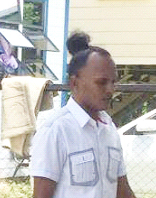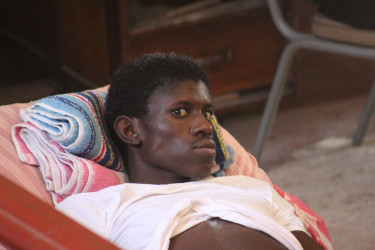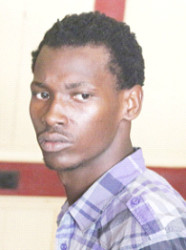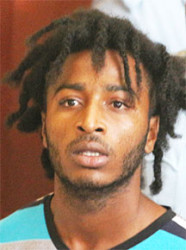Special prosecutor Nigel Hughes yesterday told a court that he has supplied enough evidence to convict the five accused in the robbery and wounding of land court judge Nicola Pierre and her husband, Mohammed Chan.
Delivering closing arguments in the trial of Premnauth Samaroo, Warren McKenzie, Anthony David, Daymeion Millington and Nicholas Narine yesterday, Hughes told Magistrate Zamilla Ally-Seepaul that each of the five men, even by being accessories after the fact, are guilty of the crime of armed robbery, felonious wounding, and discharging a loaded firearm.
Samaroo, McKenzie, David, Millington and Narine were charged with robbing the judge and her husband of cash and articles amounting to over $3.6 million as well as for wounding them and shooting at security guard Ron Peters, in an attack that took place between the night of July 8th and the morning of July 9th, 2015.

Before Hughes began his arguments yesterday, two of the co-accused, Millington and McKenzie, who have been unrepresented by an attorney during the trial, refused to make any final submissions to the court.
Hughes subsequently told the court that all of the men acted in concert on the night of July 8th leading into the morning of July 9th. In the case of Samaroo, he said that although he was picked up by the police with three others on the night of the attack, their alibis were not coherent.
Hughes said that in the testimony of two of the three men who were allegedly with Samaroo on that night, neither could have identified any landmark that would have guided them to Agriculture Road on the East Coast. Hughes asked the court to see this as something that was particularly odd—for a group of men to journey up the East Coast without a sense of direction or landmark to pick up a friend.
In their testimony, Samaroo and the men had claimed that after their journey to Agriculture Road, their car broke down at Better Hope, when they were making their way

back to Georgetown.
Hughes said the reason why Samaroo was picked out from an identification parade by security guard Peters was because he was there on the night of the attack. According to the lawyer, Peters saw Samaroo flagging down cars while trying to flee from the scene. Hughes said that Samaroo was on the East Coast and being arrested by the police that same night placed him in the vicinity. Therefore, he told the court that it must raise some suspicion that Samaroo, who was positively identified by the guard, was on the East Coast, despite his claims that he did not commit the robbery.
Addressing Narine’s involvement, Hughes noted that he was positively identified by both Justice Pierre and her husband. During the identification parade that was conducted via Skype for the then overseas Justice Pierre, Narine was placed in a panel with several other men who looked like him and they viewed by panel and then individually, Hughes said. He noted that while the defence claimed there was an unfair identification and that Narine was singled out during the parade, this was not the case as both Pierre and the officer in charge of the parade testified that she saw him with a group of men then she saw each man’s individual profile.
Hughes also noted that at the time of the parade both Justice Pierre and her husband were abroad but in different countries, so it was not a case of them passing information between each other to choose Narine.
According to Hughes, Narine was not just picked out by facial recognition but by voice recognition as well. In Justice Pierre’s testimony, Hughes said, she had

indicated that Narine was the one who told her that she was “solid” during the attack.
Hughes also told the court to remember that Narine was the one who took her into a separate room and had her in his sights for several minutes. According to him, she had told the court that Narine was unmasked and was with her alone for several minutes. He said her vision was never impaired and it was significant. Her husband, who also identified Narine, he said, had noted that he was unmasked and was hitting him and his wife.

The case against David, Hughes said, consisted of an oral statement that he allegedly made to Officer Mitchell Caesar. In that statement, David claimed that he had received a call from a friend requesting pick up. The friend told David that he and some others were on a “wuk” and persons started to shoot at them.
Hughes said while the defence sought to argue that the statement was never made by the co-accused, it was found to be admissible by the magistrate. He also argued that David had to know what the friend was talking about. Hughes said that there is no job that he is aware of that is legitimate occupation where you will be fired upon. He questioned if the “wuk” of the friend was voluntary human target practice.
Hughes said that David’s friend was on a “wuk” and security opened fire on them and David had to pick them up. He told the magistrate to reject the interpretation by the defence that David was unaware of what his friends were doing when he received the phone call.
Moreover, Hughes also dismissed David’s testimony that he was charged because he refused to be an informant for Caesar. He argued that Caesar did not tell the court that he wanted David to work for him as an informant and the defence did not elicit any such admission during cross examination. Therefore, he urged the court to simply disregard that testimony from David.
Hughes said they all should be found guilty—some based on recognition and others on being accessories.
Magistrate Ally-Seepaul adjourned the matter until May 30th, while she has set June 10th for a verdict.




